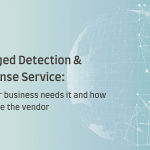Cloud computing is an essential tool for any type of business today. It uploads and transfers data quickly over the internet and across the seven seas. While there’s no doubt about the multiple benefits it could offer, using the cloud for storage of your valuable data can put the integrity of your business at risk. This has long been the issue raised by IT risk managers, but with the latest advancements in digital technology, security breach issues can now be overcome. Here’s how!
How to Minimize Security Risks when using Cloud

Choose your cloud vendor wisely
Find a small business IT solutions provider like iiNet that has a data center with high-security level. Installation of robust security measures is reflective of your provider’s capability in ensuring that all cloud computing systems in its data center are safe from potential security breaches and the encryption standards are close to something unbreakable.
Select who’s going to access your cloud for business carefully
Identify who among your staff members will have access to certain parts of your cloud. Most likely they are database administrators and Intellectual Property specialists. Before putting them the burden of making sure that the cloud is secured at all costs, provide them with robust training related to data management and security.
Pay more attention to data that requires higher level of cloud security

Determine which data stored in the cloud needs superior-level of monitoring and encryption. For example, secure databases that contain the company’s assets, pass codes, among other sensitive information to a maximum level.
Additionally, extend these robust measurements to other computing devices where these sets of information can be stored, too. Scan these devices to identify any security threats, and if found, eliminate them out of the system immediately.
Invest in a sophisticated security intelligence to protect your cloud and network systems
Identify hard-to-detect signals about potential threats against the security of your devices, because sometimes requiring a user ID and password for access is not enough. An advanced machine-learning algorithm that is able to collect all information regarding your security data can be a great help in pointing out attempts at breaching the security of your cloud system. This advanced technology may also be designed to be capable of providing real-time monitoring of your online storage infrastructures, so that you can easily track any suspicious activities on the system.
Get your recovery solutions ready

Prepare for the worst things that could happen by having a data recovery solution in place. Identify the appropriate tools for this impending disaster and do not hesitate to ask for some guidance from your service provider. A proactive cloud vendor should provide you all of the necessary information on what to do to recover from a system break down, anyway.
Cloud computing has still so much room for development, and it is here to stay. Therefore, investing in the security of your cloud infrastructure should bring you long-term results as it is crucial in protecting the growth of your business and of your people.





